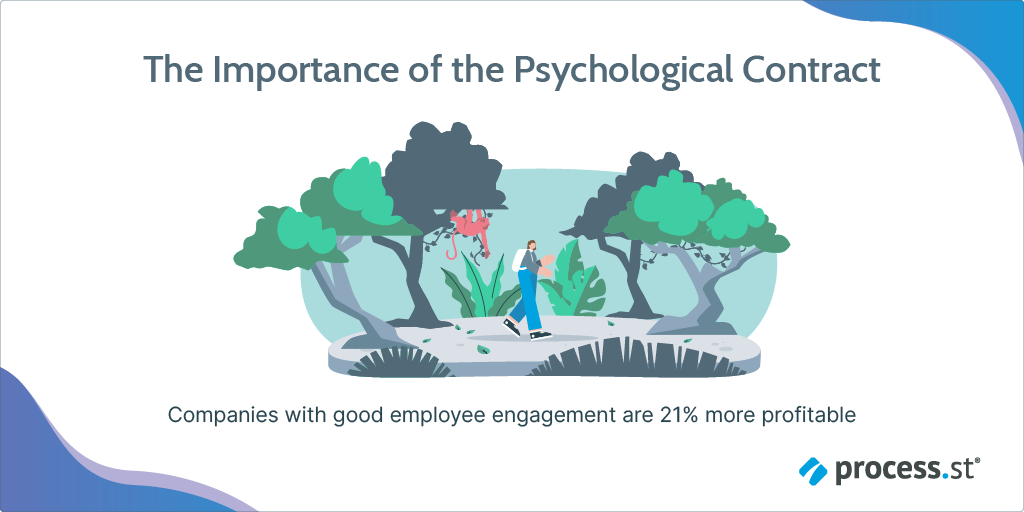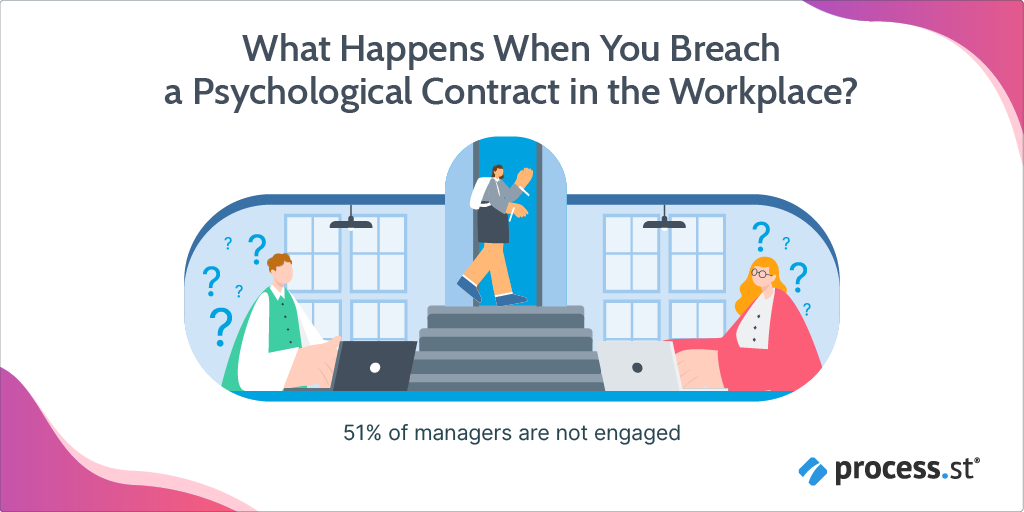
My psychological contract was beginning to wear thin.
Rats surrounded me. Then two tons of glass nearly fell on top of me. My job description, at that time, did not include kindness, reciprocity, and understanding. But an unwritten agreement with my employer made me include those qualities in my work.
The agreement I’m describing is an intangible concept. Please don’t be embarrassed; I had to look that word up too. One thing you might want to look up is that 57% of employees quit their jobs due to feeling disrespected at work. That’s where understanding and respecting the psychological contract can help.
At Process Street, we know you can trawl Google like a fishing boat with a broken net. That’s why we write posts to make topics easily accessible. Here’s one about the psychological contract:
- What is the psychological contract?
- The importance of the psychological contract
- Psychological contract example
- What happens when you breach a psychological contract in the workplace?
- Ways to improve and maintain the psychological contract
What is the psychological contract?

A psychological contract is an unwritten agreement. It should benefit an organization and its employees. It is not an idea that allows one party to manipulate the other.
A psychological contract isn’t something concrete you can hold like a job contract. It’s abstract, an idea. As well as being abstract, it constantly changes. Its rules and rewards are different in every workplace.
Denise Rousseau developed the concept of the psychological contract. A professor at Carnegie Mellon University, Rousseau outlined the idea in 1989.
The importance of the psychological contract

The psychological contract is most important if you want good job performance. The typical paper job contract can’t cover every eventuality you face as an HR manager. For example, look at this list and consider if you’ve debated these topics behind closed doors:
- Is it okay for employees to charge their mobile phones in the office?
- Can employees look at social media if they’re on top of their work?
- Do we turn a blind eye to employees using the photocopier for personal use?
Small decisions such as the above come down to an understanding between the employee and management.
From my own experience, such agreements have a testing ground. A call center I once worked in allowed people to read at their desks. No manager ever said it, but the unwritten agreement was you could if you hit your targets.
The unsigned contract
The psychological contract isn’t challenging to understand. But it needs to be accepted to ensure a cohesive work environment. Because if misunderstood, it can cause conflict and disruption. It can make a workplace productive or unproductive. It’s that simple.
For employers to understand this unwritten code, they need to consider how they act on the following topics:
- Acceptable rates of pay
- Career development
- Job security
- Training
By understanding the action an employer is taking on the above, they can guarantee:
- Concrete results
- Abstract goodwill
- Better employee retention
Psychological contract example

An example of a psychological contract would be a Japanese workplace. Employees arrive early and leave late daily to show devotion to their company. The company reciprocates by trying to ensure the employee has lifetime employment.
Employees often expect that specific behavior will produce desired behavior on the employer’s part. For instance, an employee puts in extra effort and makes sales targets. Employees may expect their excellent performance to result in perks such as schedule flexibility. They may have decided this from previous experience or information gleaned from colleagues.
What happens when you breach a psychological contract in the workplace?

When you breach the psychological contract, demotivated staff will quickly leave for the exit. The hungry job market will soon give your ex-employees a new position.
The collateral damage can also include:
- Your brand
- A decline in employee trust
- Reduced employee commitment
- Decreased performance
In the internet age, bad word of mouth can travel in a Zeptosecond. Sorry, please don’t reach for the dictionary again. We mean lousy word of mouth travels fast. Think of all those negative reviews on Glassdoor. All it takes is one tweet, and a bad review turns viral.
It’s wise to look at options for improving employee engagement and motivation. The psychological contract is always worth reexamining, particularly with the raging War for Talent.
Ways to improve and maintain the psychological contract

Focus on these five areas to improve and maintain a psychological contract:
- Onboarding
- Career development
- Your brand
- Employee communication
- Surveys
To get the most benefit from the psychological contract, you must show employees you are in an equal partnership with them. Also, you are committed to the agreement and believe it is fair.
1. Have fantastic onboarding
Your onboarding should not only be good, but it must also be realistic. Try not to promise new hires results that you cannot deliver.
If it is unlikely that your organization can raise salaries or increase bonuses, be honest with your new hire when they start. You may have a smoother ride if a new hire realizes their hard work may not immediately secure their goal.
As mentioned before, breaches in a psychological contract can be damaging and include:
- Conflict
- Stress
- Burnout
You can use onboarding positively to discover employee expectations and if your organization can meet them. Listening to employees and trusting them is what makes employees happy at work:
2. Show interest in employee career development
72% of new hires say that advancement opportunities are most important. Salary comes a close second, but career development is of utmost importance to your new employees.
You can avoid breaching the psychological contract by advising that career development may not be your organization’s current priority. Later, you may show an employee you are interested in investing in their development and draft a career progression plan. New hires who want to make an excellent first impression will especially want to hear your future vision.
3. Determine your brand: Use a consistent management style
My mother once worked for a vast American manufacturer whose business dealings became the source of an international bestseller. She explained that when the organization took over a small company, it focused on reducing electricity use.
As the economy tightens, behavior such as the above makes a lot of sense. However, if you have previously let staff charge their phones in your office, removing this perk will damage your psychological contract.
It would help if you considered small changes and how they affect your standing in your employees’ eyes. Weigh up if your company benefits from these small savings if it adversely affects your employees. Also, ensure all your managers understand what a psychological contract is:
4. Have transparent employee communication
You can build trust with an employee by clarifying your stance on onboarding and career development. You can make your company documents available 24-7 using knowledge base software. Making documentation transparent is key to gaining employee trust.
Making your documentation globally available needn’t be costly. At Process Street, we offer Pages. It’s a free forever product that collects and arranges documentation. If you want remote employees to understand your organization’s business processes, you can easily store workflows in Pages that they can access online.
We also recommend looking into the topic of psychological safety. It’s an often misunderstood subject. It’s about how a group works together and their expectations of each other. Use it to understand ethics such as:
- Commitment
- Loyalty
- Trust
5. Use anonymous surveys
A survey can quickly let you know if you are living up to your side of the psychological contract. It can also reveal what expectations your employees have of you.
With your free Process Street account, you can use our survey workflows to get the opinions of your workforce anonymously. Getting started with Process Street is easy. Why not take a look at our below survey workflows to see for yourself:
You can also request a demo to learn about the advantages of using BPM (Business Process Management). Please also try our workflow app!
Walking on broken glass
You might remember I mentioned the shift with the falling glass. You may wonder why I didn’t walk once the rats showed up. The truth is, a psychological contract kept me in place until the job was complete.
The working day for my store installation job had a five-step process:
- 11am: Drop off the old store units from the previous night’s job. The items went to a warehouse for disposal.
- 11.30am: Collect new units for the store installation that night.
- Noon: Go home and get some sleep.
- 4.30pm: Arrive at a retail park, examine the store and check the blueprints match. Ensure the guest electrician had uncoupled the power supply to the furniture.
- 7pm to 4.30am: Remove old furniture. Fit new furniture, and attach all new electric lighting.
The job hours could be longer if something went wrong. Two of my not-so-favorite errors were:
- A colleague would dismiss the blueprints and, in doing so, add 4 hours to the job.
- An electrician would remove the wrong panel, allowing rats to flood into the store. I would then dance around all night to avoid standing on glue traps.
I love the sound of breaking glass
My psychological contract with the company kept me in place on nights when jobs went wrong. The agreement I had with the company had reciprocal benefits.
Many jobs often involved assembling equipment such as stereos, televisions, and power washers. Those jobs took 20 minutes to do instead of 12 hours but paid the same amount. I could also pick and choose my assignments and take leave whenever needed. In my mind, the installation company and I had a fair psychological contract.
Please let us know about any experiences you’ve had with psychological contracts. We’d love to know your thoughts in the comments box below!







Mark Jones
Mark Jones is a content writer at Process Street.